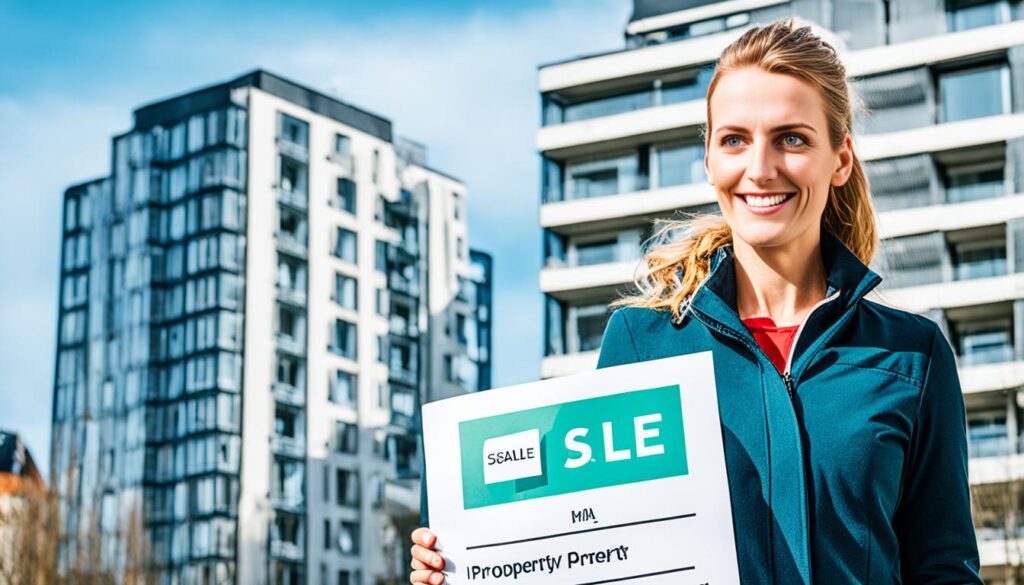Buying property in Germany as a foreigner is not only feasible but also presents a valuable investment opportunity. With a reputation for a stable economy and a well-structured legal framework, foreign buyers, regardless of their origin, can navigate the German real estate market with ease. There are no special requirements for non-German citizens, including Americans, as obtaining a residence permit is not necessary when considering a property purchase. This guide will delve into pivotal factors to consider, highlight market dynamics, and offer insights on financing options, making it easier for you to explore investing in German real estate as a non-resident. For further reading, check out this resource, which can help you better understand the market landscape.
Key Takeaways
- Foreigners can buy property in Germany without restrictions.
- The average price for an apartment in Germany is around €4,741/m² in 20241.
- Real estate taxes range from 3.5% to 6.5% depending on the location2.
- Key documents required include proof of financing and a valid passport1.
- Mortgage options are available for both EU and non-EU citizens with varying requirements3.
- Understanding local market trends is crucial for making an informed investment1.
Contact us if you are Interested in Buying Property Abroad!
Introduction to Buying Property in Germany
Understanding the landscape of buying property in Germany is essential for international investors looking to explore opportunities within this desirable market. Foreigners can indeed buy property in Germany, resulting in a vibrant and diverse property landscape that caters to a broad range of investment strategies. In fact, there are no restrictions for non-EU citizens in purchasing property, creating an open market for global buyers4.
The German real estate market has gained a reputation for safety and long-term profitability, particularly notable in metropolitan areas such as Berlin and Frankfurt. For instance, prospective buyers in Berlin should anticipate spending approximately 15% of the purchase price on overall costs, while the national average is closer to 10%4. Understanding these cost structures can greatly facilitate the journey of buying homes in Germany as a foreigner.
Another crucial factor to consider is the financing aspect. Typically, real estate is financed through bank loans that cover around 60-80% of the purchase price, with foreign buyers not residing in Germany expecting financing of up to 60% of the buying price5. Therefore, this aligns well with the interests of investors seeking lucrative opportunities.
As one navigates the complexities of property purchases in Germany, the differences between local and foreign investors become evident. Foreign buyers may need to familiarize themselves with specific regulations and best practices unique to the German real estate market, which can significantly differ from their home countries. Overall, the opportunity for real estate investing in Germany continues to grow, attracting a multitude of international investors eager to participate in this prosperous market.
The Stability ofaqf the German Real Estate Market

The German real estate market remains attractive due to its stable political and economic environment, which assures investors of safety and reliability. Various factors contribute to this stability, particularly its robust economic framework and historical resilience against fluctuating global trends.
Economic Environment
Germany’s economy faced challenges in recent years, shrinking by 0.3% in the fourth quarter of 2023, making it the worst-performing major economy globally6. Despite this, employment has increased significantly by more than 15% in the period from 2005 to 2019, rising from 39.3 million to 45.3 million people6. Such growth demonstrates a persistent demand for housing, driving real estate market trends in Germany. While more than half of companies in the residential construction sector reported a lack of orders (55.2%) recently6, the necessity for housing remains paramount, underscoring long-term investment opportunities.
Historical Market Resilience
The resilience of the German real estate market cannot be underestimated. Even during global economic downturns, property values have shown an upward trend, primarily supported by a continuous high demand for rental properties. Foreign buyers accounted for 35% of commercial property purchases in Germany in the first quarter of the year, indicating sustained interest despite softer performance compared to the previous year6. With the buying process typically taking 2-4 months7, investors can efficiently navigate the market, reinforcing the attractiveness of investing in real estate here.
Can Foreigners Buy Property In Germany?

Foreigners face no restrictions when it comes to buying property in Germany. The liberal framework surrounding foreign ownership laws in Germany allows non-residents to enjoy the same property rights as German citizens, fostering an inviting environment for those interested in buying property as a non-German citizen.
One advantage of purchasing real estate is that there is no visa requirement to buy a house in Germany. This makes the process notably accessible for international investors. Property prices have surged over the past decade, with an impressive increase of 94% from 2010 to 2022, well above the EU average of 45%8.
Additionally, potential buyers need to consider the associated costs. Property purchase costs, known as Nebenkosten, range between 7% and 12% of the property’s price, which is an important aspect to factor into the overall investment here9. Cities like Munich stand out with some of the highest property prices, making it crucial to engage with resources like price atlases and property evaluation services to navigate the market effectively.
Investing in Germany provides various offerings, including pathways to residency through employment or entrepreneurship. Resources like GermanPedia assist over 10,000 members in making informed decisions about property purchases. To enhance the chances of a successful purchase, obtaining a creditworthiness letter from a German bank is a recommended procedure9.
Ultimately, understanding the local market dynamics, including mortgage options, is vital. While a common down payment stands at 20%, prospective buyers who do not reside in Germany may find themselves needing at least 40%8. By evaluating different financing options, you can maneuver the sometimes complex landscape of purchasing real estate in this thriving economy.
Benefits of Investing in Real Estate in Germany

Investing in German real estate as a non-resident comes with numerous advantages. With a stable economy and favorable climate for investment, real estate remains a sought-after asset class. This section will explore the key benefits of investing in this thriving market, focusing on the high demand for rental properties and the overall political and economic stability.
High Demand for Rental Properties
The demand for rental properties in Germany continues to rise, fueled by a growing population and evolving lifestyle preferences. Many individuals and families prefer renting to homeownership, leading to an increase in the necessity for quality rental options. Residential property investment in Germany is expected to contribute to a substantial market value of EUR20.3 trillion by 2040, illustrating the long-term viability of this sector10. This escalating demand creates a promising landscape for investors, as consumer spending on housing rent is projected to grow by an average of 51% by 204010.
Stable Political and Economic Environment
Germany’s political and economic framework stands as a cornerstone for attractive real estate investments. Its GDP, amounting to EUR3.87 trillion, positions Germany among the world’s largest economies, enhancing investor confidence10. Additionally, the country has witnessed growing investments in residential properties, reaching around EUR7.5 billion in 202310. Such stability makes it an appealing option for non-residents wishing to enter the market and benefit from potential tax relief and favorable fixed interest rates.
| Benefit | Description |
|---|---|
| High Demand for Rentals | Growing population and preference for renting fuel the need for diverse rental properties. |
| Market Growth | Residential property investment is projected to reach a value of EUR20.3 trillion by 2040. |
| Stability | Robust GDP and continued investment in real estate enhance market confidence. |
| Tax Advantages | Investors may benefit from favorable tax conditions in the property sector. |
With the steady increase in High Net Worth Individuals (HNWIs) and Ultra High Net Worth Individuals (UHNWIs) in Germany, expected to surpass 3.4 million by 202710, investing in German real estate as a non-resident seems like a strategic decision for many.
Contact us if you are Interested in Buying Property Abroad!
Legal Framework for Foreign Property Ownership

The legal framework governing property ownership regulations in Germany ensures that purchasing real estate as a foreigner is both feasible and straightforward. There are no nationality-based restrictions, which allows foreign buyers to invest without significant barriers.
In Germany, all real estate contracts must be signed in front of a notary public, ensuring the authenticity of transactions11. This notarial process is crucial in safeguarding rights and clarifying obligations, which emphasizes the need for legal assistance when navigating the complexities of the market.
Understanding the various laws and regulations can significantly impact prospective buyers by influencing contracts, obligations, and potential tax liabilities11. For instance, while foreigners can purchase most types of properties, there are specific restrictions on certain property types such as agricultural and forestry land11.
Conducting due diligence is essential. Buyers should carefully review title deeds, verify planning permissions, and assess financial records before making a purchase11. Engaging with local legal professionals not only aids in identifying potential pitfalls but also ensures that property ownership complies with all legal expectations.
Ultimately, understanding the legal landscape surrounding property ownership regulations in Germany plays a significant role in making informed investment decisions11. For those interested in more detailed guidance on the legal intricacies of buying property in Germany, additional resources may be helpful, such as legal guidelines for foreign buyers.
Understanding Property Ownership Regulations in Germany
Germany offers a welcoming regulatory environment for foreign property buyers, making it an attractive destination for investors. Understanding the foreign ownership laws in Germany is essential for anyone looking to make a purchase. Foreigners can freely acquire property without complicated restrictions, which ensures that all nationalities enjoy equal rights in the real estate market.
Foreign Ownership Laws in Germany
The law governs property ownership in a straightforward manner, ensuring that there are no legal restrictions on ownership by specific classes of persons12. Article 14 I 1 of the German Constitution recognizes the right to property as a fundamental right12. The legal framework allows various forms of ownership, including co-ownership and condominium ownership, ensuring flexibility in property investment12.
It is important for foreign buyers to know that all land must be registered in the land registry, with a notarized agreement necessary for ownership transfer12. This process allows buyers to gain clear ownership rights recognized legally.
Residence Permit Not Required
One of the most appealing aspects for international investors is that a residence permit is not required to purchase property in Germany13. This allows foreign buyers to interact directly with the real estate market without additional bureaucratic hurdles. With a structured and well-organized legal system, foreign investors can easily navigate their property transactions.
Notably, German laws provide similar protections and rights to foreign buyers as to German citizens, ensuring that all parties engage under standardized legal frameworks. Property rights are protected under the law, giving overseas investors the confidence they need to move forward with their purchases.
| Aspect | Detail |
|---|---|
| Property Ownership Restrictions | No restrictions on foreigners |
| Legal Rights | Equal rights for all nationalities |
| Residence Permit Requirement | Not required |
| Notarization Requirement | Required for ownership transfer |
| Land Registration | Mandatory for all real estate |
This information reflects a robust and investor-friendly atmosphere in Germany, making property ownership accessible, safe, and compliant with legal standards.
Financial Considerations When Buying Property

Understanding financial aspects when purchasing property in Germany is vital for potential investors. Buyers must navigate various elements, including property prices and market trends, which can vary widely across different regions. With property prices averaging around €4,741 per square meter, metropolitan areas like Berlin and Munich usually have higher costs compared to other regions13. A low interest rate environment, with mortgages typically ranging between 1-2%, makes financing quite attractive for investors13.
Property Prices and Market Trends
As more individuals shift towards rental accommodations, with around 52% of the German population preferring this option, home ownership rates remain relatively low13. Analyzing property prices and market trends reveals consistent demand for rental properties, especially in urban centers, as many renters seek quality living spaces. Property purchase taxes vary, with rates from 3.5% to 6.5% depending on the area, adding to the overall costs buyers should anticipate14.
Equity Capital Requirements
When looking to finance a property purchase, buyers should be prepared to allocate approximately 20-30% of the property price as equity capital, demonstrating a serious financial commitment13. This equity capital requirement is crucial for securing favorable mortgage terms, as German lenders prefer that buyers cover closing costs themselves. Furthermore, foreign buyers can access up to 55% mortgages, facilitating their entry into the market14.
Costs Associated with Purchasing Real Estate

When considering the costs associated with purchasing real estate in Germany, buyers must prepare for various fees that may significantly increase the total expenditure. The main expenses involve the property transfer tax, notary fees, and real estate agent fees. Understanding these costs will help in budgeting more effectively.
Transfer Tax and Notary Fees
In Germany, the property transfer tax varies depending on the federal state, generally ranging from 3.5% to 6.5% of the total sale price15. Furthermore, notary fees typically account for about 1.5% to 2% of the property’s value15. When combined, these costs can add up, reaching an additional approximate total of 15% of the purchase price, making it essential for buyers to factor in these essential expenditures.This resource provides further details about the overall buying process
Real Estate Agent Fees
Real estate agent fees in Germany can range from 3.5% to 8% of the sale price plus VAT at 19%15. These fees are often shared between buyers and sellers, depending on the arrangement. Given the rising property prices, especially in major cities16, being informed about these fees is crucial for prospective buyers. Allocating a comprehensive budget that includes these potential costs will aid in a smoother purchasing experience.
Mortgage Options for Foreign Buyers
Navigating the mortgage landscape as a foreign buyer in Germany can be quite manageable with a clear understanding of the requirements. Generally, EU citizens enjoy favorable conditions, with lending terms comparable to those of German nationals, and in some cases, they may secure financing up to 100% of the property’s value. Conversely, non-EU citizens may face more stringent conditions, often requiring a larger deposit and undergoing a more rigorous approval process. Non-EU citizens with temporary residence permits can access various mortgage options if employed by a German company for a minimum of three months and earning a monthly income between €1,500 to €2,50017.
How to Secure a Mortgage in Germany
In securing a mortgage in Germany, understanding the documentation required is crucial. Applicants will typically need to provide a valid form of identification, proof of their residence permit, registration documents, and property-related paperwork. For employees, it is necessary to present salary slips from the last three months along with a salary statement from the previous year. Meanwhile, freelancers and self-employed individuals must submit tax documentation such as tax returns and profit and loss statements. It’s worth mentioning that self-employed applicants may face difficulties in approval as they are considered higher-risk borrowers17.
Requirements for Non-EU vs. EU Citizens
While EU nationals can often expect similar mortgage borrowing limits as their German counterparts, some lenders may require a greater deposit upfront. According to Statista, Germany is among three European nations with over a trillion euros in outstanding mortgage balances as of 202218. It’s also critical to recognize that the German mortgage system supports repayment terms up to 30 years, although the mortgage process typically includes various fees for applications and caps repayments at a maximum of 35% of an applicant’s monthly income18. For those nearing retirement age, lenders will evaluate if pension income meets required thresholds, potentially complicating mortgage approval in these scenarios17.
Contact us if you are Interested in Buying Property Abroad!
FAQ
Can foreigners buy property in Germany?
What are the benefits of investing in German real estate as a non-resident?
Are there any nationality-based restrictions on property ownership in Germany?
What are the property prices and market trends in Germany?
What costs should I anticipate when purchasing real estate in Germany?
How do I secure a mortgage in Germany as a foreign buyer?
What are the equity capital requirements when buying property in Germany?
Is a residence permit required for purchasing property in Germany?
Source Links
- https://www.ptireturns.com/blog/buying-property-germany-foreigner/
- https://www.lawyersgermany.com/purchase-a-property-in-germany
- https://www.kaiserslauternamerican.com/thinking-of-buying-a-home-in-germany-buyers-beware/
- https://www.knightfrank.com/overseas-property/germany-overview/buying-in-germany
- https://www.notar-stuppi.de/de/upload/Buying_real_estate_in_Germany(1).pdf
- https://www.euronews.com/business/2024/05/21/german-property-crisis-deepens-as-foreign-investment-dries-up
- https://aapkikhabre.com/ultimate-guide-buying-your-dream-home-in-germany/
- https://www.expatica.com/de/housing/buying/buying-a-german-property-100945/
- https://germanpedia.com/buying-house-germany/
- https://www.ipglobal-ltd.com/insights/germany-property-investment/
- https://kittenproperties.com/blog/germany’s-real-estate-market-key-legal-considerations/
- https://iclg.com/practice-areas/real-estate-laws-and-regulations/germany
- https://www.iamexpat.de/housing/buy-house-germany
- https://howtogermany.com/housing/real-estate/investing-in-german-property/
- https://www.iamexpat.de/housing/buy-house-germany/taxes-costs-fees
- https://koronapay.com/transfers/europe/en/blog/how-to-buy-a-property-in-germany/
- https://www.iamexpat.de/housing/german-mortgages/basic-requirements-mortgage-germany
- https://www.expatica.com/de/housing/buying/getting-a-mortgage-in-germany-740222/

Comments